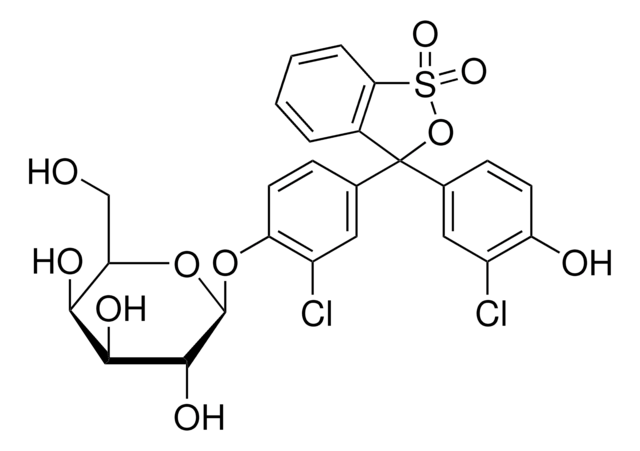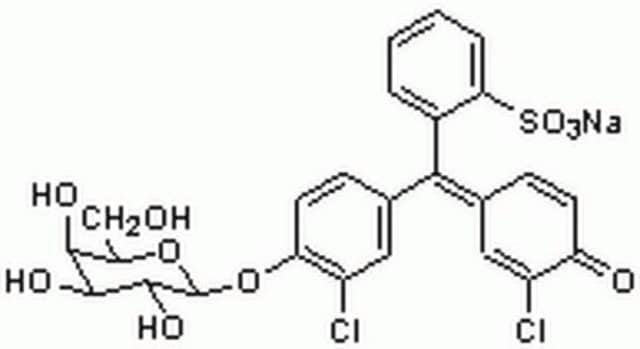10884308001
Roche
CPRG
Chlorophenol red-β-D-galactopyranoside
Synonym(s):
Chlorophenol Red-β-D-galactopyranoside, chlorophenol red-β-d-galactopyranoside, CPRG, Chlorophenol Red-β-D-galactoside
About This Item
Recommended Products
Quality Level
Assay
96% (HPLC)
form
powder
packaging
pkg of 250 mg
manufacturer/tradename
Roche
storage condition
protect from light
pH range
6-8
shipped in
dry ice
storage temp.
−20°C (−15°C to −25°C)
SMILES string
OC[C@H]1O[C@@H](Oc2ccc(cc2Cl)C(=C3/C=CC(=O)C(Cl)=C3)\c4ccccc4S(O)(=O)=O)[C@H](O)[C@@H](O)[C@H]1O
InChI
1S/C25H22Cl2O10S/c26-15-9-12(5-7-17(15)29)21(14-3-1-2-4-20(14)38(33,34)35)13-6-8-18(16(27)10-13)36-25-24(32)23(31)22(30)19(11-28)37-25/h1-10,19,22-25,28,30-32H,11H2,(H,33,34,35)/b21-12-/t19-,22+,23+,24-,25-/m1/s1
InChI key
YOUWVNCQJOMMEU-AETRGLENSA-N
Looking for similar products? Visit Product Comparison Guide
General description
The chemical formula on the label represents the monosodium salt.
Application
Biochem/physiol Actions
Quality
Sequence
Preparation Note
Storage conditions (working solution): Reconstituted solution is stable for one day at 2 to 8 °C
Storage and Stability
Other Notes
Storage Class Code
11 - Combustible Solids
WGK
WGK 1
Flash Point(F)
No data available
Flash Point(C)
No data available
Certificates of Analysis (COA)
Search for Certificates of Analysis (COA) by entering the products Lot/Batch Number. Lot and Batch Numbers can be found on a product’s label following the words ‘Lot’ or ‘Batch’.
Already Own This Product?
Find documentation for the products that you have recently purchased in the Document Library.
Customers Also Viewed
Our team of scientists has experience in all areas of research including Life Science, Material Science, Chemical Synthesis, Chromatography, Analytical and many others.
Contact Technical Service















